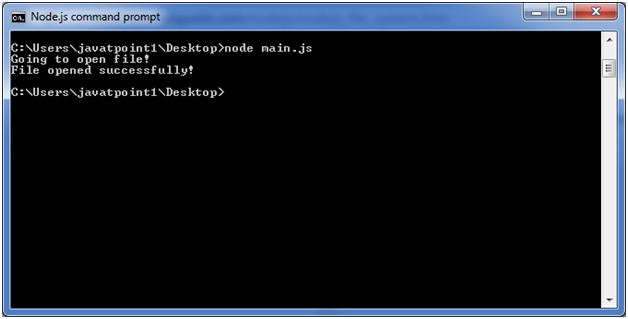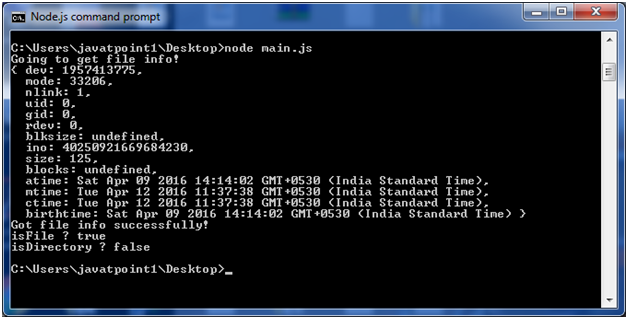Node.js Tutorial
- Node.js Tutorial
- Install Node.js on Windows
- Install Node.js on Linux/Ubuntu/CentOS
- Node.js First Example
- Node.js Console
- Node.js REPL
- Node.js Package Manager
- Node.js Command Line Options
- Node.js Global Objects
- Node.js OS
- Node.js Timer
- Node.js Errors
- Node.js DNS
- Node.js Net
- Node.js Crypto
- Node.js TLS/SSL
- Node.js Debugger
- Node.js Process
- Node.js Child Process
- Node.js Buffers
- Node.js Streams
- Node.js File System (FS)
- Node.js Path
- Node.js StringDecoder
- Node.js Query String
- Node.js ZLIB
- Node.js Assertion Testing
- Node.js V8
- Node.js Callbacks
- Node.js Events
- Node.js Punycode
- Node.js TTY
- Node.js Web Module
- NestJS
Node.js MySQL
Node.js MongoDB
Nodejs Difference
Node.js MCQ
Node.js Express
Nodejs Interview Questions
Node.js File System (FS)
In Node.js, file I/O is provided by simple wrappers around standard POSIX functions. Node File System (fs) module can be imported using following syntax:
Syntax:
- var fs = require("fs")
Node.js FS Reading File
Every method in fs module has synchronous and asynchronous forms.
Asynchronous methods take a last parameter as completion function callback. Asynchronous method is preferred over synchronous method because it never blocks the program execution where as the synchronous method blocks.
Let's take an example:
Create a text file named "input.txt" having the following content.
File: input.txt
- Javatpoint is a one of the best online tutorial website to learn different technologies
- in a very easy and efficient manner.
Let's take an example to create a JavaScript file named "main.js" having the following code:
File: main.js
- var fs = require("fs");
- // Asynchronous read
- fs.readFile('input.txt', function (err, data) {
- if (err) {
- return console.error(err);
- }
- console.log("Asynchronous read: " + data.toString());
- });
- // Synchronous read
- var data = fs.readFileSync('input.txt');
- console.log("Synchronous read: " + data.toString());
- console.log("Program Ended");
Open Node.js command prompt and run the main.js:
- node main.js

Node.js Open a file
Syntax:
Following is the syntax of the method to open a file in asynchronous mode:
- fs.open(path, flags[, mode], callback)
Parameter explanation:
Following is the description of parameters used in the above syntax:
path: This is a string having file name including path.
flags: Flag specifies the behavior of the file to be opened. All possible values have been mentioned below.
mode: This sets the file mode (permission and sticky bits), but only if the file was created. It defaults to 0666, readable and writeable.
callback: This is the callback function which gets two arguments (err, fd).
Node.js Flags for Read/Write
Following is a list of flags for read/write operation:
| Flag | Description |
|---|---|
| r | open file for reading. an exception occurs if the file does not exist. |
| r+ | open file for reading and writing. an exception occurs if the file does not exist. |
| rs | open file for reading in synchronous mode. |
| rs+ | open file for reading and writing, telling the os to open it synchronously. see notes for 'rs' about using this with caution. |
| w | open file for writing. the file is created (if it does not exist) or truncated (if it exists). |
| wx | like 'w' but fails if path exists. |
| w+ | open file for reading and writing. the file is created (if it does not exist) or truncated (if it exists). |
| wx+ | like 'w+' but fails if path exists. |
| a | open file for appending. the file is created if it does not exist. |
| ax | like 'a' but fails if path exists. |
| a+ | open file for reading and appending. the file is created if it does not exist. |
| ax+ | open file for reading and appending. the file is created if it does not exist. |
Create a JavaScript file named "main.js" having the following code to open a file input.txt for reading and writing.
File: main.js
- var fs = require("fs");
- // Asynchronous - Opening File
- console.log("Going to open file!");
- fs.open('input.txt', 'r+', function(err, fd) {
- if (err) {
- return console.error(err);
- }
- console.log("File opened successfully!");
- });
Open Node.js command prompt and run the main.js:
- node main.js

Node.js File Information Method
Syntax:
Following is syntax of the method to get file information.
- fs.stat(path, callback)
Parameter explanation:
Path: This is string having file name including path.
Callback: This is the callback function which gets two arguments (err, stats) where stats is an object of fs.Stats type.
Node.js fs.Stats class Methods
| Method | Description |
|---|---|
| stats.isfile() | returns true if file type of a simple file. |
| stats.isdirectory() | returns true if file type of a directory. |
| stats.isblockdevice() | returns true if file type of a block device. |
| stats.ischaracterdevice() | returns true if file type of a character device. |
| stats.issymboliclink() | returns true if file type of a symbolic link. |
| stats.isfifo() | returns true if file type of a fifo. |
| stats.issocket() | returns true if file type of asocket. |
Let's take an example to create a JavaScript file named main.js having the following code:
File: main.js
- var fs = require("fs");
- console.log("Going to get file info!");
- fs.stat('input.txt', function (err, stats) {
- if (err) {
- return console.error(err);
- }
- console.log(stats);
- console.log("Got file info successfully!");
- // Check file type
- console.log("isFile ? " + stats.isFile());
- console.log("isDirectory ? " + stats.isDirectory());
- });
Now open the Node.js command prompt and run the main.js
- node main.js



